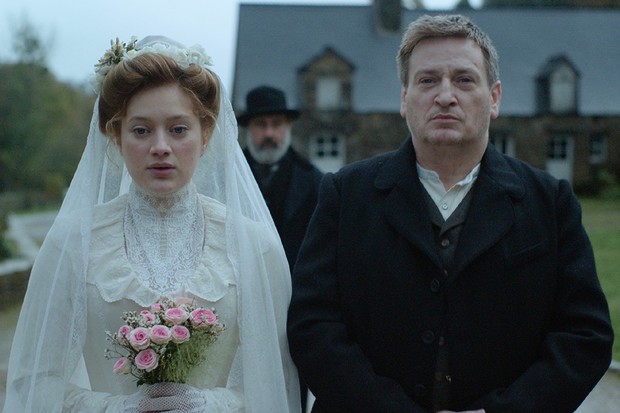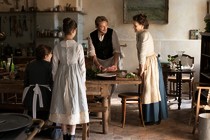Review: Rosalie
- CANNES 2023: Nadia Tereszkiewicz and Benoît Magimel elevate a very classic film by Stéphanie Di Giusto on an incredibly difficult subject

When, on paper, you’re presented with a film about a bearded woman in the 19th century, it’s reasonable to have your doubts. That said, David Lynch’s The Elephant Man and Tod Browning’s Freaks, to give just a couple of stand-out examples, have amply demonstrated that the melting pot of human anomalies can give rise to great cinematic works. This isn’t quite the case with Stéphanie Di Giusto’s Rosalie, unveiled in the Un Certain Regard line-up of the 76th Cannes Film Festival, but the French filmmaker has nonetheless done a more than honourable job, delivering a classic and well-controlled second feature film (after The Dancer [+see also:
film review
trailer
film profile], which spent time in the same selection on the Croisette in 2016) telling a story of supposedly impossible love, carried by two brilliant actors, Nadia Tereszkiewicz and Benoît Magimel, with a special mention going to the former who not only had the audaciousness to accept the role in the first place, but also to play it with incredible ease.
"Don’t do that, they’re going to humiliate you, I know them, they’re thugs". When you differ from the social norm, being openly yourself can be a dangerous thing: you run the risk of rousing the instincts of a pack of hounds cornering their prey. But fear doesn’t always reside where you’d think it would, and Rosalie (Nadia Tereszkiewicz) swiftly becomes aware of this in Brittany in 1870 when her father sells her to Abel (Benoît Magimel), a coffeeshop owner twice her age. The latter, an honest man at a time when women don’t count for much, doesn’t have any twisted motivations for buying her, just a debt to pay to Barcelin (Benjamin Biolay) who owns the local factory. But a sizeable surprise awaits Abel at the beginning of his wedding night: this young, beautiful, pious and sensitive bride has suffered since birth from a hormonal imbalance which leaves her covered in hair; the hint of a beard (which she shaves every day) can even be detected by those who endeavour to look closely enough.
Abel rejects her immediately, fuelled by embarrassment and a sense of social shame. It’s always been a curse for Rosalie, who has dreamed for so long of being loved for who she is. But full of bravado, she soon enters into a bet with a client of the tavern, so as to at least earn money for her household and to fill the deserted cafe with curious onlookers: a month from now, the locals will get to see a bearded woman. But challenging the norm does have its consequences…
An eminently feminist melodrama, Rosalie questions the values and outlooks arbitrarily delineating the border between what’s human and what certain people might describe as monstrous. It’s a limit (which might also be a perfect metaphor for any other huge apparent difference) which Stéphanie Di Giusto explores with sensitivity, her meticulous and up-close exploration of the fluctuating feelings between the two main characters rightly placed at the heart of her entire approach. Around them are a handful of archetypical figures (the idiotic and nasty Guillaume Gouix, the feudal factory boss Benjamin Biolay who changes his point of view in accordance with his financial interests, the younger girls who are tempted to admire Rosalie’s courage, etc.), but we nonetheless find ourselves transfixed by the violin and piano score composed by Hania Rani, and we’re moved by Rosalie’s touching emotions and Abel’s procrastination in the build up to the film’s wonderful ending.
Rosalie is produced by Trésor Films in co-production with France 3 Cinéma and Laurent Dassault Rond Point, Belgium’s Artémis Productions, and Gaumont who are also steering international sales.
(Translated from French)
Did you enjoy reading this article? Please subscribe to our newsletter to receive more stories like this directly in your inbox.

























